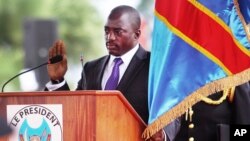Political parties in the Democratic Republic of Congo signed a deal on New Years’ Eve that eased the political crisis after deadly unrest over delayed elections. But now that agreement risks falling apart as the two sides wrangle over its implementation. Observers say they are running out of time if they are to have any hope of holding the polls this year.
The December 31 deal demands the polls be held by the end of this year and keeps President Joseph Kabila in office until then. In the accord, Kabila’s political alliance agreed that he will not seek a third term, though some in Congo still fear the president means to change the constitution so he can do just that.
The agreement provides for a new government led by a prime minister from the largest opposition platform, the Rassemblement.
The deal’s survival, however, is not assured and the Congolese Catholic Church, the deal’s increasingly frustrated mediator, says the two sides have until Saturday to reach an agreement on the make-up of the new government and how to implement the rest of the deal.
Christophe Lutundula, a senior Rassemblement politician, told VOA they expect to make the deadline. He says what we have seen from the other side since the signing of the accord does not incite blissful optimism. But, he says, the Rassemblement remains vigiliant and committed to finding a solution.
Ruling alliance vs Rassemblement
For its part, the ruling alliance has denounced the Rassemblement for wanting to impose a prime minister upon the president. It argues that the opposition must present Kabila with five options.
Even if the two sides do agree on a new government this weekend, experts say organizing nationwide polls by the end of the year will be difficult. The Democratic Republic of Congo is a vast and poorly connected country, and public finances are particularly strained at the moment, largely due to the global dip in commodities prices since 2014.
Experts say the new government will need to muster rapid international support to fund the elections.
In December, the president of the electoral commission estimated that the full electoral package will cost $1.8 billion. In October, the Constitutional Court authorized the delay of the polls, which were scheduled for November, because the commission said it needs to redo the voter registry. That work has begun but it is a massive undertaking expected to take until at least the end of July.




